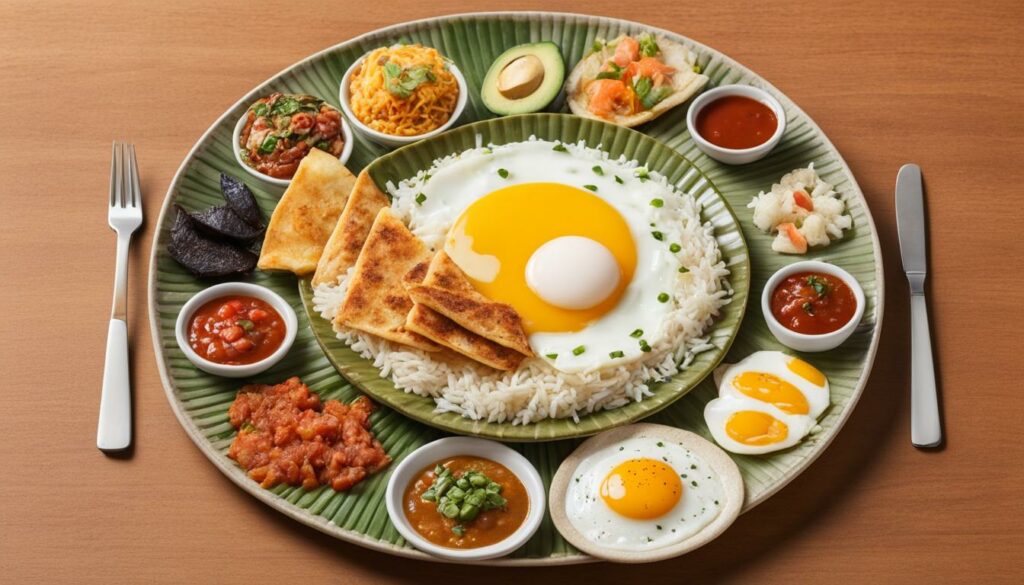Have you ever wondered why we call our first meal of the day “breakfast”? The word itself has an interesting history that dates back centuries. Let’s explore the origin, etymology, and meaning behind the term “breakfast.”
The word “breakfast” is a combination of two words: “break” and “fast.” It refers to breaking the fast that was observed during the night or early morning hours. In other words, it is the first meal that breaks the period of fasting we undergo while we sleep.
The term “breakfast” has been in use in the English language since the 15th century, but the concept of breaking the fast in the morning dates back much further. It is believed that breakfast as a regular meal became more common in Western Europe during the 16th century.
In its early stages, breakfast was a simple morning meal consisting of bread, cheese, and fruit. Over time, the morning meal evolved to include more substantial dishes like porridge and eggs. The specific foods consumed for breakfast have varied across different cultures and time periods.
Ancient civilizations had their own interpretations of breakfast. In ancient Egypt, breakfast often consisted of bread and beer. Ancient Greeks enjoyed a light meal of bread dipped in wine or water. And in ancient Rome, breakfast typically included bread, cheese, or leftovers from the previous night’s dinner.
The concept of breakfast continued to evolve throughout history. In the 19th century, with the invention of cereals and other packaged breakfast foods, breakfast became more popular and diverse. Today, breakfast is considered an important meal in many cultures and is enjoyed in various forms, including cereal, toast, eggs, fruit, and pancakes.
Breakfast is not only a means to break the fast and fuel our bodies for the day ahead; it is also a reflection of our cultural heritage and traditions. The diversity of breakfast foods around the world showcases the unique culinary experiences of different societies.
Key Takeaways:
- The word “breakfast” comes from combining “break” and “fast,” signifying the meal that breaks the overnight fast.
- Breakfast has been a part of human culture since ancient times, with different civilizations having their own interpretations of the morning meal.
- In Western Europe, breakfast became more common during the 16th century, evolving from a simple meal of bread, cheese, and fruit to include hot dishes like porridge and eggs.
- The 19th century saw the introduction of cereals and other packaged breakfast foods, leading to greater breakfast variety and popularity around the world.
- Today, breakfast is enjoyed in numerous forms and is an important meal that provides sustenance and reflects cultural traditions.
The Origins of Breakfast: Ancient Times to Present-Day Brunches
The origins of breakfast can be traced back to ancient times when civilizations developed their own morning meal traditions.
Ancient Egypt
In ancient Egypt, breakfast was an essential meal for peasants before they started their work in the fields. It typically consisted of a simple but hearty meal of soup, beer, bread, and onions.
Ancient Greece
Akratisma was the morning meal in ancient Greece. It involved dipping bread into wine and occasionally enjoying figs or olives as accompaniments. These simple yet satisfying flavors provided nourishment to kickstart the day.
Ancient Rome
Ancient Romans had a diverse breakfast called ientaculum. This morning meal included a variety of foods such as bread, cheese, olives, salad, nuts, raisins, and cold meat. The Romans believed in a balanced breakfast to fuel their day ahead.
Throughout history, breakfast has evolved and adapted to different cultural norms and culinary advancements. From the humble meals of peasant farmers to the elaborate brunches of the modern era, breakfast continues to hold a special place in our daily routines and traditions.
The Changing Face of Breakfast: From Simple to Elaborate
Breakfast has undergone a remarkable transformation, evolving from simple, easy-to-prepare foods to a diverse array of elaborate options. While traditional breakfast items like bread, cheese, and fruit are still enjoyed by many, modern breakfast menus now offer an extensive variety to cater to different tastes and dietary preferences.
Hot dishes like porridge and eggs continue to be popular breakfast choices, providing warmth and comfort. However, the breakfast landscape has expanded to include a wide range of other options that reflect changing trends and evolving dietary needs.
- Cereal: A classic breakfast staple, cereals have evolved to encompass a wide range of flavors, textures, and ingredients. From whole grain flakes to granola clusters, there’s a cereal to suit every palate.
- Yogurt Parfaits: Yogurt layered with fresh fruits, granola, and nuts has emerged as a popular breakfast option, offering a balanced combination of protein, fiber, and vitamins.
- Acai Bowls: Originating from Brazil, acai bowls have gained popularity worldwide due to their refreshing taste and nutritional benefits. These bowls are made with acai pulp, topped with fresh fruits, granola, and honey.
- Avocado Toast: This trendy option features mashed avocado spread on toasted bread, often paired with toppings like poached eggs, smoked salmon, or feta cheese.
- Smoothies: Blending fruits, vegetables, yogurt, and other ingredients, smoothies provide a convenient and refreshing way to start the day with a burst of nutrients and natural flavors.
Furthermore, breakfast is not limited to homemade meals. Many individuals now choose to enjoy a leisurely breakfast at cafes and restaurants, indulging in a variety of creative and Instagram-worthy dishes.
“The diverse options available for breakfast nowadays have truly transformed this meal into an exciting culinary experience. From the comfort of a steaming bowl of porridge to the vibrant colors and flavors of smoothie bowls, breakfast has become an opportunity for self-expression and exploration of different tastes and textures.”

The delightful image above captures the ever-changing breakfast trends, showcasing the evolving diversity and variety in our morning meals.
Breakfast Around the World: A Melting Pot of Cultures
Breakfast varies greatly from culture to culture around the world. Each country has its own unique breakfast traditions, reflecting the diverse culinary landscapes and cultural heritage of its people. Let’s take a virtual journey and explore some popular international breakfasts:
American Breakfast
In America, a typical breakfast might include pancakes, waffles, eggs, bacon or sausage, and coffee. This hearty meal provides a satisfying start to the day and is enjoyed by many across the nation.
Japanese Breakfast
In Japan, breakfast is a traditional affair and often consists of rice, miso soup, pickled vegetables, and fish. This balanced and nutritious meal reflects the emphasis on simplicity and seasonal ingredients in Japanese cuisine.
Mexican Breakfast
Mexican breakfasts are known for their bold flavors and vibrant spices. A popular dish is huevos rancheros, which features fried eggs served on top of tortillas, often accompanied by salsa, beans, and avocado.
Guatemalan Breakfast
In Guatemala, breakfast is a cherished meal and often includes the traditional dish of tamales, which are made from corn dough filled with various ingredients like meat, cheese, or vegetables. This delicious and filling breakfast is enjoyed by locals and visitors alike.
Puerto Rican Breakfast
In Puerto Rico, a favorite breakfast choice is ripe plantains with eggs. This combination of sweet and savory ingredients creates a unique and delightful flavor profile that satisfies the taste buds.

These are just a few examples of the diverse breakfast traditions around the world. From the hearty American breakfast to the delicate flavors of Japanese cuisine, breakfast showcases the cultural richness and culinary creativity of different societies. Exploring international breakfasts allows us to appreciate the distinct ways people start their day and highlights the importance of food in shaping our cultural identities.
Conclusion
Breakfast is more than just a meal; it is a cultural phenomenon that has evolved over centuries. With its origins dating back to ancient times, breakfast has transformed from a simple morning meal to a diverse and elaborate feast enjoyed by people around the world.
Not only does breakfast provide the necessary energy and nutrients to kick-start the day, but it also holds significance in connecting individuals with their loved ones through shared meals. Whether it’s gathering around the breakfast table at home or enjoying a brunch date at a local café, breakfast brings people together, fostering a sense of community and bonding.
From the traditional staples of bread, cheese, and fruit to the modern-day favorites like avocado toast and smoothie bowls, breakfast continues to captivate our taste buds and inspire culinary innovation. Its global influence can be witnessed in the different breakfast traditions and dishes that vary from country to country, showcasing the rich diversity of cultures and cuisines.
In conclusion, breakfast is not only a vital component of a healthy lifestyle but also a celebration of tradition, community, and gastronomic delights. So, the next time you indulge in a delicious breakfast, savor the flavors and appreciate the significance of this beloved morning ritual.
Delicious and Healthy Bircher Muesli Recipe | Start Your Morning Right
FAQ
Why is breakfast called breakfast?
The term “breakfast” comes from the combination of two words: “break” and “fast.” It refers to breaking the fast observed during the night or early morning hours.
What is the origin of the word breakfast?
The word “breakfast” has been in use in English since the 15th century. However, the concept of breaking the fast in the morning dates back much further.
How did breakfast evolve over time?
Breakfast as a regular meal became more common in Western Europe during the 16th century. It started with a simple morning meal consisting of bread, cheese, and fruit and evolved to include hot dishes like porridge and eggs.
What did people eat for breakfast in ancient times?
In ancient Egypt, breakfast often consisted of bread and beer, while in ancient Greece, it was a light meal of bread dipped in wine or water. Breakfast in ancient Rome typically included bread, cheese, or leftovers from the previous night’s dinner.
How has breakfast changed in modern times?
Breakfast became more popular and diverse in the 19th century, with the invention of cereals and other packaged breakfast foods. Today, breakfast options range from traditional dishes like cereal, toast, and eggs to more elaborate choices like acai bowls, avocado toast, and smoothies.
What are some cultural breakfast traditions from around the world?
Breakfast varies greatly from culture to culture. In America, a typical breakfast might include pancakes, eggs, bacon or sausage, and coffee. In Japan, a traditional breakfast consists of rice, miso soup, pickled vegetables, and fish. Mexican breakfasts often feature huevos rancheros, while Guatemalan breakfasts include tamales.
What is the significance of breakfast?
Breakfast is not only a meal but also a cultural phenomenon that has evolved over centuries. It provides the energy and nutrients needed to start the day and serves as a way to connect with family and friends over a shared meal.














